Applications Down 4.5 Percent at HBS, But Applicant Quality Remains High

The release of the Harvard Business School (HBS) Class of 2020 profile statistics last week revealed that the Boston school—like many of its U.S. peers—saw a decrease in overall application volume, but median GMAT score and GPA remained unchanged from the prior year at 730 and 3.71 respectively. The admit rate, 11 percent, was also unchanged year over year. So though he was working from a smaller pool of 9,886 applicants (down from 10,351 last year), Managing Director of Admissions and Financial Aid Chad Losee did not sacrifice on quality.
Harvard Business School Application Slips for Class of 2020
HBS is one of many leading U.S. business schools to see application volume drop off in this most recent application cycle. A strong economy paired with concerns among international applicants about potential student and work visa challenges made for even more dramatic declines at schools like UNC Kenan-Flagler and Georgetown’s McDonough School, which reported double-digit drops of 18.3 and 16.2 percent respectively. Yield at HBS–which is to say the percentage of admitted students who chose to enroll–slipped from 91 to 90 percent. Still, HBS remains far and away the leader in this statistic.

Applications are down 4.5 percent at HBS, but declines across other U.S. MBA programs was much more apparent.
At HBS, the 4.5 percent application volume decline was spread between both international and domestic applicants. International students make up slightly more of the HBS class this year, 37 percent compared to 35 percent last year. They hail from 69 countries as compared to 70 for the Class of 2019.
Another interesting development is the increase in GRE takers among admitted students. A record-setting 15 percent of the incoming class got there on the strength of their GRE scores, up from 12 percent last year. It’s only in the past couple of years that schools have begun to disclose the percentages of students who submit GRE scores in lieu of GMAT scores, which used to be the gold standard. But at HBS and elsewhere, a growing number of applicants seem to be taking schools at their word that they are indeed test agnostic.
There were not a lot of major shifts elsewhere in the statistics for the newest HBS class. The percentage of women is down by one point, slipping from 42 to 41 percent. U.S. ethnic minorities remained constant year over year at 26 percent of the class. The average age also remains unchanged at 27.
Applicants from Private Equity, Tech, Increase
In terms of prior work experience, there were again few shifts from the prior year. Slightly more students came in from private equity/venture capital (16 percent, compared to 15 percent last year), tech (also 16 percent, up from 15), and government/non-profit (7 to 8 percent). These upticks correlate with small declines in students from industrial/heavy manufacturing and other services. Military veterans make up 5 percent of the Class of 2020, on par with the Class of 2019.
And in terms of what students in this year’s entering class studied as undergraduates, again HBS showed little fluctuation. Economics/business majors make up the largest portion—46 percent, up from 45 percent last year. STEM undergrads also increased one percentage point, from 36 to 37 percent. Humanities/social science undergraduates made up just 17 percent of the class, down from 19 percent last year.
To view HBS’s complete Class of 2020 profile, click here.
This article has been edited and republished with permissions from our sister site, Clear Admit.
Northwestern Kellogg MBA Class of 2020: 46 Percent Women, 27 Percent U.S. Minorities

Northwestern University’s Kellogg School of Management announced today that women will make up 46 percent of the incoming two-year, full-time MBA Class of 2020. That’s a four-percentage point jump over last year and a record high for the school. U.S. minorities are also up—comprising 27 percent of this year’s first-year students, as compared to 25 percent last year. Meanwhile, average GMAT (732) and GPA (3.6) were identical to last year. Class size also remained constant at 478.
“I am very, very thrilled with the diversity of the class,” Melissa Rapp, Kellogg Director of Admissions for full-time MBA and MSMS programs, told Clear Admit. “And not just because of the percentages but also the quality of candidates across the board,” she said. International students will make up 34 percent of the incoming class, drawn from 46 countries around the globe, a modest one-percentage point decline amid soft overall international applicant volume to U.S. schools.
Rapp pledged that she and her team will keep striving to attract the most diverse classes possible. “I firmly believe that diversity in the classroom leads to better learning and a more impactful experience for every student who is here,” she said.

Steady State Elsewhere Is Great
For the past six years Kellogg’s average GMAT score has been on the rise, climbing from 708 in 2012 to 732 last year. Rapp said she is not at all concerned to have it remain static at 732 this year. “That our average GMAT and GPA have stayed the same shows that we continue to attract a really outstanding pool of applicants year after year,” she said.
Average undergraduate GPA also didn’t budge—coming in at 3.6 for now the third year running. As for what applicants studied while in college, 50 percent of this year’s incoming class majored in business or economics, up from 49 percent last year and 45 percent the year before that. STEM majors fell slightly to 29 percent, down from 30 percent the year before. Humanities majors both this year and last made up the remaining 26 percent.
Varied Professional Experience
In terms of pre-MBA work experience, approximately one in four incoming Kellogg students—24 percent—come from consulting, down from 27 percent last year. Another 19 percent come from the financial services industry, also a slight decrease from last year’s 20 percent.
Up this year? Students who have worked in tech/communications grew from 12 to 13 percent. “I think the changes that we see in our class really reflect the changes that we see in the business world,” Rapp said. “There are more people from tech, which is not surprising for anyone since there is more tech in the world than there ever has been.” Students with government/education/nonprofit experience also increased, from 7 to 9 percent.
Overall Rapp is pleased to see Kellogg continuing to attract a wide range of students from across functions and industries. “The variety continues to be very strong both in terms of our incoming students and our outgoing graduates,” she added. “Again, those differences and that diversity is what makes the Kellogg experience so strong.”
Kellogg’s Efforts to Support Women May Off
By far the biggest news today is that Kellogg has come closer than ever before to gender parity with its newest incoming class. USC Marshall School of Business made headlines last month by becoming the first leading business school to cross the 50/50 mark—women will make up 52 percent of the Marshall Class of 2020, a staggering 20-percentage-point jump over last year. At UT Austin’s McCombs School, which has also shared a preliminary Class of 2020 profile, the percentage of women slipped year over year, from 40 to 38 percent. And at Cornell’s Johnson Graduate School of Management, which welcomed it new Class of 2020 students to campus last week, women make up 33 percent, a five-point gain over last year.
“It’s really pretty exciting,” said Rapp of Kellogg’s 46 percent women. She credits the gains in female enrollment in part to the vision and leadership of outgoing Kellogg Dean Sally Blount, who served as dean from 2010 until she stepped this past spring.
Kellogg has also called on its current female students, including members of the Kellogg’s student-led Women’s Business Association (WBA), to take part in admissions outreach activities in hopes that they can forge meaningful connections with prospective female candidates early in their exploration process.

Melissa Rapp, Kellogg Director of Admissions for the full-time MBA and MSMS programs.
New this year, the school also convened its inaugural Global Women’s Summit in May. More than 1,200 women participated “live”—with 800 at Kellogg’s Global Hub in Evanston and the rest via extension events in London, Hong Kong, New York, Boston, San Francisco, Miami, Seattle, and Chicago hosted by companies including Amazon, Microsoft, and Starbucks. Over the course of the two-day event, the #KelloggWomen hashtag was trending in Chicago and generated 2.7 million overall impressions. “The breadth of engagement the summit allowed for provided a really nice bridge from prospectives to current students to our alumnae population,” Rapp said.
Kellogg also this year hosted its third-annual Women’s Leadership Seminar, a unique five-week lineup for second-year MBA students combining lectures, workshops, networking events, and alumni panels on recruiting issues women face. “The goal is to ensure that our high-potential women are equipped to pursue and navigate careers that have deep personal and professional meaning,” Rapp said.
“This combination of everything from lunch and learns to seminars to summits really helps the women here know that Kellogg understands the unique situation they are in and the challenges they will face on their journey to become impactful leaders and is proactively talking about that and helping them navigate that.”
Those Kellogg women, it seems, have been doing a good job of helping prospective female applicants see Kellogg as a place they want to be, too.
This article has been edited and republished with permissions from our sister site, Clear Admit.
GMAT Scores, International Students Jump at NYU Stern
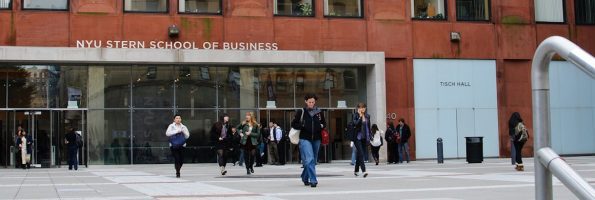
Last week, the NYU Stern School of Business shared a preliminary profile of its Class of 2020. Even amid some declines, the school showed gains in the diversity of its class and added a few points to the average GMAT score for incoming students.
This year saw 3,781 applicants—down from 3,927 for the Class of 2019. Among the new applicants, 876 were admitted (23 percent) and a total of 375 enrolled. Last year, 822 applicants were admitted (21 percent), yielding 402 enrolled students.
Although the percentage of female students dropped slightly from the previous year (38 to 35 percent), the Class of 2020 is more global than the Class of 2019. International students increased from 37 percent last year to 39 percent, even as overall international MBA application volume to U.S. schools faltered.
“International applications were down about 10 percent this year, but they still represent about half of total applications, so we had a very strong pool of applications from which to admit,” an NYU spokesperson says.
The percentage of minority students held steady at 29 percent—the same as the previous year. But of those, 13 percent this year are underrepresented minorities (U.S. citizens and permanent residents who identify as African American/Black, Hispanic, or Native American/Alaskan Native), up 2 percentage points over the Class of 2019.
The average GMAT score for incoming students this year increased to 717—a three-point gain over the previous class. However, the median GMAT maintained the same score as the previous class, sitting at 720. At the same time, applicants opting to submit GRE scores instead of GMAT scores jumped from 12 to 19 percent, while the average GPA slipped slightly from 3.48 to 3.45.
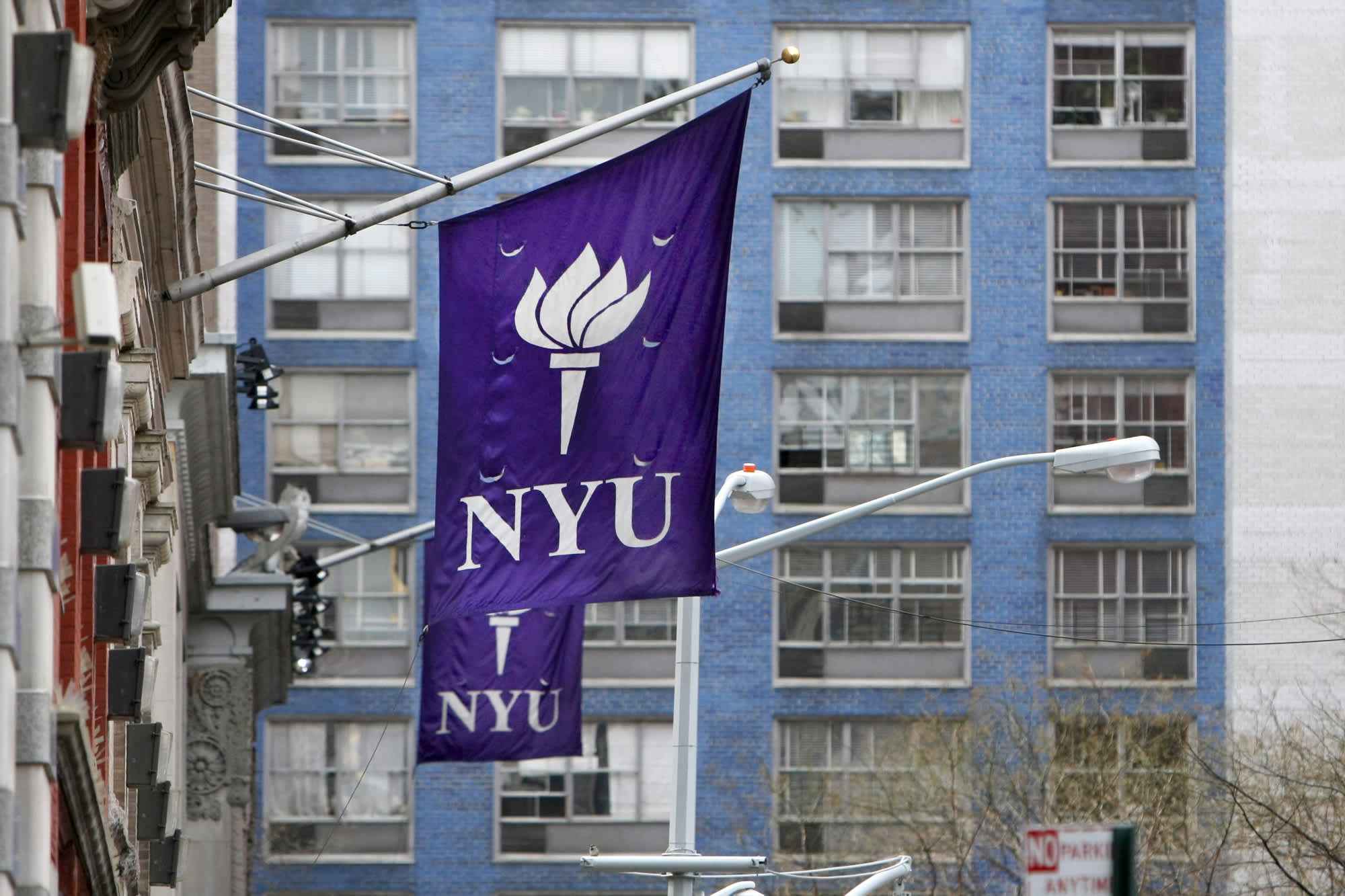
The NYU Stern Class of 2020 sported a 717 GMAT average; three points higher than the previous class.
The Class of 2020 has a diverse educational background. Approximately 29 percent of students studied business as undergrads, more than any other major. Another 20 percent of the incoming class have degrees in engineering, math, and science. Economics, humanities, and social sciences majors make up the rest of the class, totaling 18 percent, 17 percent, and 16 percent, respectively.
Stern also continued its efforts to recruit military veterans and active duty service members, including through the Fertitta Veterans Program. Now in its second year, the program underwrites more than half of the tuition bill for approximately 20 incoming students annually. Veterans and active duty service members comprise 7 percent of the Class of 2020, similar to last year.
The average work experience among incoming students increased from 4.9 years for the Class of 2019 to to 5.3 years this year. More than a quarter—26 percent—of the Class of 2020 comes in with previous experience working in financial services, and another 13 percent come from consulting. The three next largest feeder industries are technology, entertainment/media, and military/government, making up 9 percent, 7 percent, and 7 percent, respectively. With regard to post-MBA career aspirations, members of the Class of 2020 are increasingly interested in consulting, technology, entrepreneurship, and healthcare.
Click here or more information on the NYU Stern Class of 2020.
This article has been edited and republished with permissions from our sister site, Clear Admit.
Forté Announces New MBAExplore Program for Pre-MBA Women

Deciding whether or not you want to go to business school to earn your MBA is not usually a spur-of-the-moment decision. There are a lot of questions you need to answer first. Is an MBA the right degree for you? How will it impact your career? Does it make sense financially? To help women who may be considering these and other questions, the Forté Foundation recently launched its new MBAExplore program. The deadline to apply is July 8th.
This half-day program gives women the opportunity to learn more about what an MBA is and isn’t. It takes women on an intimate exploration of the myths and questions surrounding business school to help them map their journey to the MBA. Women who have already traveled the MBA path teach the program, sharing their first-hand experience with participants.
Inside MBAExplore

The MBAExplore program provides valuable information around each of the following topics:
- Taking and passing the GMAT
- Financing and affording the MBA
- Understanding the classroom case study
- Figuring out if the MBA is right for you
Throughout the half-day, participants will have a chance to learn about the daily life of an MBA student. There will also be an opportunity to ask questions of business school staff as well as current MBA students. The goal is to provide every participant with the information they need to determine if the MBA is right for them.
The MBAExplore program is the precursor to Forté MBALaunch, a 10-month program designed to help prospective women business school applicants build their b-school applications. MBAExplore is all about helping women gain the confidence, guidance, and information they need to take the first step toward their MBA degree. Learn more here.
Register Today
Registration ends July 8, 2018, and the MBAExplore program will be held in Washington DC on August 13, 2018, and New York City on August 28, 2018. You can register now for just $49 at the location of your choosing. Space is limited. Don’t miss out.
The Texas MBA Programs Guide: Houston vs. Dallas
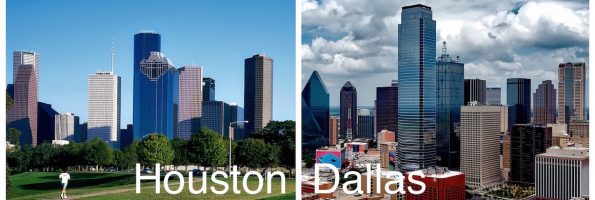
If you’re looking to earn a Texas MBA, where should you go to school? Should you choose a top MBA program in Dallas or Houston? First, we need to take a look at the cities.
Living in Dallas vs. Houston
First, let’s take a look at the cost of living in Dallas vs. Houston. According to Numbeo, the world’s most extensive database containing user contributed data about cities, the overall cost of living is relatively similar: $4,242 in Houston compared to $4,000 in Dallas. Houston barely edges out Dallas with a slightly higher cost of living, and here’s how that’s broken down.
- Consumer Prices: 35 percent higher in Houston
- Rent Prices: 7.30 percent higher in Houston
- Restaurant Prices: 27 percent higher in Houston
- Groceries Cost: 95 percent higher in Houston
- Local Purchasing Power: 26 percent lower in Houston
Other things to consider when choosing between Dallas and Houston include:
- Industries
- Houston is known for being the oil capital and is an ideal location for jobs in the energy industry.
- Dallas, on the other hand, is known for real estate (Tramelle Crow is headquartered here), as well as hedge funds and asset management firms.
- Economic Development: According to Site Selection Magazine, Houston and Dallas are comparatively equal when it comes to economic development, ranking second and third respectively.
- Top Companies: Houston edges out Dallas for being home to more Fortune 500 companies. In fact, Houston is home to 27 top companies compared to 14 in Dallas. However, they rank second and third respectively.
However, according to Forbes, “while Houston and Dallas have decent amenities (and having better ones surely wouldn’t hurt), they aren’t places that offer a unique lifestyle brand, such as charming architecture or a cutting-edge arts scene.”
Texas MBA Programs
The next step is to compare the top three MBA programs in each city. In particular, we wanted to take a look at the tuition rates (two years), GMAT averages, and post-graduation salaries at each program in each city to get a well-rounded picture.
Overall, there are a few things to note right away.
- The top full-time MBA programs in both cities are ranked well. However, Houston programs tend to rank higher on major ranking sites such as The Economist and Bloomberg Businessweek.
- Houston tends to be more expensive regarding tuition ($93,052 vs. $69,191), but it also pays a higher salary ($110,000 vs. $92,000). This balances out with around a $25,000 difference in tuition and a $20,00 difference in post-graduation salary.
- Finally, GMAT averages for class profiles tend to be higher in Houston as well (688 vs. 660).
Here’s how it all breaks down per school.
Top 3 Houston MBA Programs
McCombs School of Business – University of Texas at Austin
The McCombs School of Business offers a full-time MBA, an Evening MBA, a Weekend MBA, and an Executive MBA program. And it’s considered one of the top business schools in the country, consistently ranking highly on various lists, including ranking 28 according to The Economist.
- Tuition Rates (two years): $91,000
- GMAT Averages: 703
- Post-Grad Salaries (Mean): $117,068
Rice University – Jones Graduate School of Business
The Jones Graduate School at Rice University offers a full-time MBA program, an MBA for Professionals (part-time), and an Executive MBA Program. The school’s full-time MBA program ranked 10th on the Bloomberg Businessweek list in 2017.
- Tuition Rates (two years): $116,000
- GMAT Averages: 711
- Post-Grad Salaries (Mean): $112,158
Mays Business School – Texas A&M University
The Mays Business School has both a full-time MBA program as well as a part-time Professional MBA program. In addition, the school offers an Executive MBA. In 2017, The full-time MBA program ranked 20th overall by Forbes, and 22nd overall by Bloomberg Businessweek.
- Tuition Rates (two years): $72,158
- GMAT Averages: 649
- Post-Grad Salaries (Mean): $103,299
Top 3 Dallas MBA Programs
Naveen Jindal School of Management – University of Texas at Dallas
The Naveen Jindal School offers a full-time MBA, part-time Professional MBA, Executive MBA, and Global Leadership Executive MBA program. The full-time MBA is well ranked according to the U.S. News & World Report, ranking 16th among public university programs in the U.S.
- Tuition Rates (two years): $27,603
- GMAT Averages: 678
- Post-Grad Salaries (Mean): $86,644
Cox School of Business – Southern Methodist University
The Cox School of Business at SMU offers a full-time MBA, Fast Track MBA, Professional MBA (part-time), and an Executive MBA program. Most recently, SMU Cox achieved its first Financial Times ranking at 91st.
- Tuition Rates (two years): $91,952
- GMAT Averages: 661
- Post-Grad Salaries (Mean): $96,587
Neeley School of Business – Texas Christian University
At the Neeley School of Business at TCU, MBA applicants can apply to the full-time MBA, Accelerated MBA, Professional MBA (part-time), Accelerated Professional MBA, or MBA for Energy Professionals program. The Economist ranked the Neeley School MBA ranks 61st overall on its most-recent ranking.
- Tuition Rates (two years): $88,020
- GMAT Averages: 640
- Post-Grad Salaries (Mean): $93,010
Dallas vs. Houston Breakdown in Charts
When breaking down the data between MBA programs in Dallas and Houston, here’s what it looks like:
Texas MBA Tuition
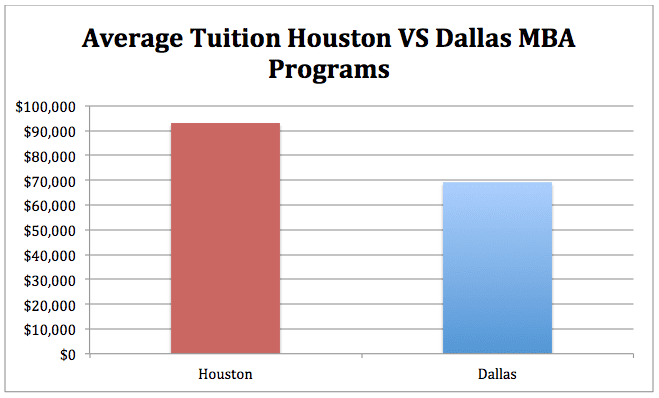
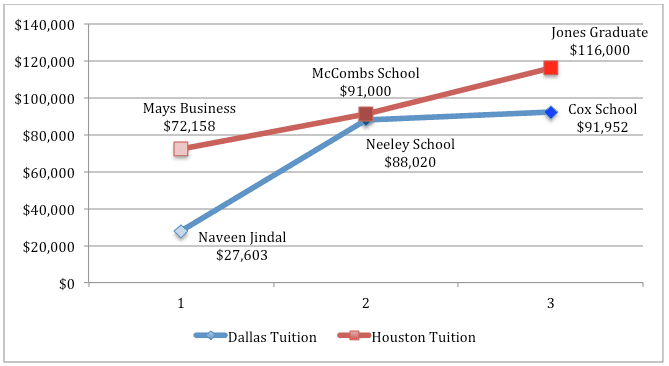
Texas MBA GMAT Averages
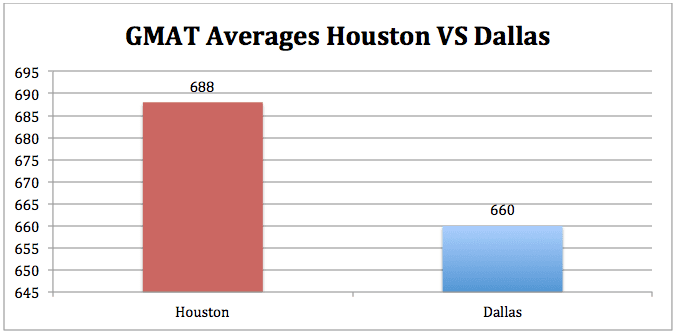
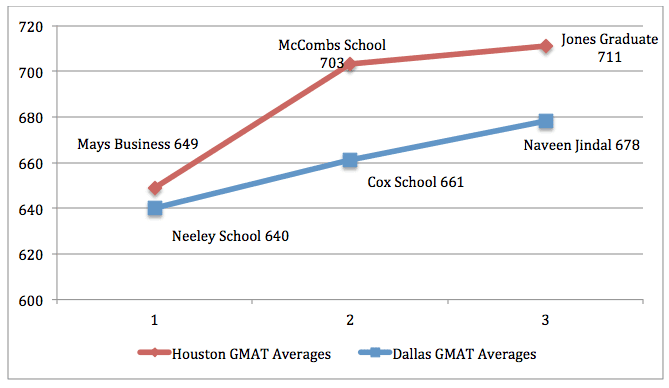
Texas MBA Post-Graduation Salaries
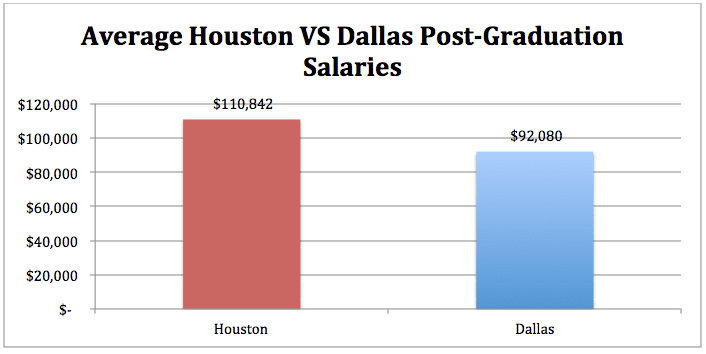
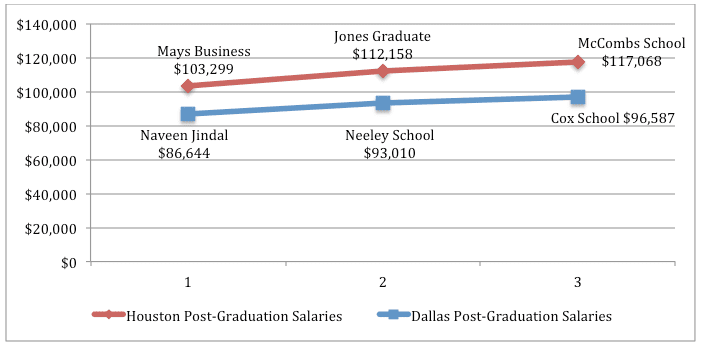
76ers’ JJ Redick Had To Reschedule GMAT to Accommodate Playoff Schedule

When the Philadelphia 76ers season hit its lowest point, guard JJ Redick, a Duke University alum, was apparently planning on earning his MBA.
